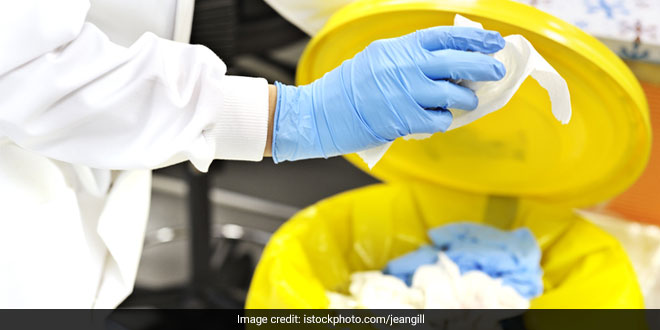Highlights
- Bar code system initiated in all government, private hospitals in Punjab
- Smaller health facilities like sub-centres are connected to hospitals
- Tracking GPS systems have been installed in vehicles carrying waste
Chandigarh: To ensure the scientific management of bio-medical waste (BMW), a bar code system is being used in all government and private hospitals across Punjab. The state’s Health Minister Balbir Singh Sidhu said that considering BMW as the most hazardous and infectious, bar code system has been implemented thoroughly. “Tracking GPS systems have also been installed in vehicles that carry the waste to the Common Bio-medical Waste Treatment and Disposal Facility (CBWTF),” read a statement from Information and Public Relations Department, Punjab.
Mr Sidhu said that this mechanism is proving a milestone to save the environment of Punjab and prevent the spread of infectious diseases such as COVID-19 and Hepatitis among the populations.
The Health Minister said that dedicated state advisory committee and district-level monitoring committees are constituted in all the districts as per the guidelines. Regular meetings are being conducted to ensure the scientific management of bio-medical waste across the state. All CBWTF operators are directed to ensure regular and timely collection of bio-medical waste using bar-code software from all healthcare facilities in accordance with the provisions of the BMWM Rules, 2016 (amendments 2018 & 2019).
Mr Sidhu further said that the Health & Family Welfare Department has uploaded all the details/ reports of daily BMW generation on the software, whereby all the record of waste pick up from each hospital is recorded. No waste is being dumped under-ground in the hospitals or elsewhere.
The Minister added that liquid waste pre-treatment plant/ ETP/ STP were planned and being installed in all DH and SDH by PHSC, whereas for CHCs it’s underway. Complete disposal of waste hypo-fixer solution, developer and X-ray films generated in HCFs is also done through a proper channel as per the rules.
The smaller health facilities like sub-centers are connected to the nearby hospitals for BMW disposal, he said adding that all hospitals even the smaller ones are now connected with the CBWTF for disposal of BMW.
Also Read: COVID-19: Delhi’s Bio-Medical Waste Treatment Facilities Under Pressure Due To Increased Load
NDTV – Dettol Banega Swasth India campaign is an extension of the five-year-old Banega Swachh India initiative helmed by Campaign Ambassador Amitabh Bachchan. It aims to spread awareness about critical health issues facing the country. In wake of the current COVID-19 pandemic, the need for WASH (Water, Sanitation and Hygiene) is reaffirmed as handwashing is one of the ways to prevent Coronavirus infection and other diseases. The campaign highlights the importance of nutrition and healthcare for women and children to prevent maternal and child mortality, fight malnutrition, stunting, wasting, anaemia and disease prevention through vaccines. Importance of programmes like Public Distribution System (PDS), Mid-day Meal Scheme, POSHAN Abhiyan and the role of Aganwadis and ASHA workers are also covered. Only a Swachh or clean India where toilets are used and open defecation free (ODF) status achieved as part of the Swachh Bharat Abhiyan launched by Prime Minister Narendra Modi in 2014, can eradicate diseases like diahorrea and become a Swasth or healthy India. The campaign will continue to cover issues like air pollution, waste management, plastic ban, manual scavenging and sanitation workers and menstrual hygiene.
[corona_data_new]





























